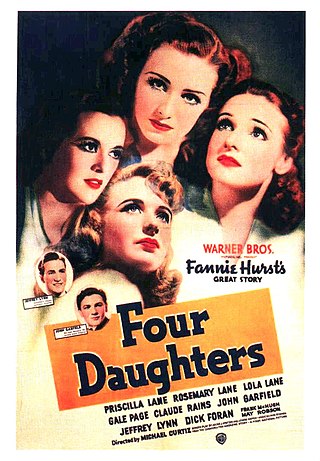
Four Daughters is a 1938 American romance film that tells the story of a happy musical family whose lives and loves are disrupted by the arrival of a charming young composer who interjects himself into the daughters' romantic lives. His cynical, bitter musician friend comes to help orchestrate his latest composition and complicates matters even more. The movie stars the Lane Sisters and Gale Page, and features Claude Rains, Jeffrey Lynn, John Garfield, and Dick Foran. The three Lanes were sisters and members of a family singing trio.
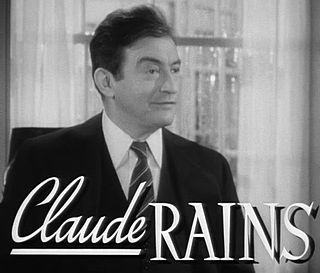
William Claude Rains was a British and American actor whose career spanned almost seven decades. After his American film debut as Dr. Jack Griffin in The Invisible Man (1933), he appeared in The Adventures of Robin Hood (1938), Mr. Smith Goes to Washington (1939), The Wolf Man (1941), Casablanca (1942), Kings Row (1942), Notorious (1946), Lawrence of Arabia (1962), and The Greatest Story Ever Told (1965).
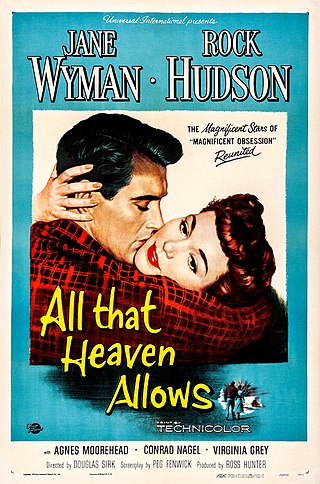
All That Heaven Allows is a 1955 American drama romance film directed by Douglas Sirk, produced by Ross Hunter, and adapted by Peg Fenwick from a novel by Edna L. Lee and Harry Lee. It stars Jane Wyman and Rock Hudson in a tale about the social complications that arise following the development of a romance between a well-to-do widow and a younger man, who owns a tree nursery. In 1995, the film was selected for preservation in the United States National Film Registry.

Sir David Lean was an English film director, producer, screenwriter, and editor, widely considered one of the most important figures of British cinema. He directed the large-scale epics The Bridge on the River Kwai (1957), Lawrence of Arabia (1962), Doctor Zhivago (1965), Ryan's Daughter (1970), and A Passage to India (1984). He also directed the film adaptations of Charles Dickens novels Great Expectations (1946) and Oliver Twist (1948), as well as the romantic drama Brief Encounter (1945).

Kings Row is a 1942 film starring Ann Sheridan, Robert Cummings, Ronald Reagan and Betty Field that tells a story of young people growing up in a small American town at the turn of the twentieth century. The picture was directed by Sam Wood. The film was adapted by Casey Robinson from a best-selling 1940 novel of the same name by Henry Bellamann. The musical score was composed by Erich Wolfgang Korngold, and the cinematographer was James Wong Howe. The supporting cast features Charles Coburn, Claude Rains, Judith Anderson and Maria Ouspenskaya.
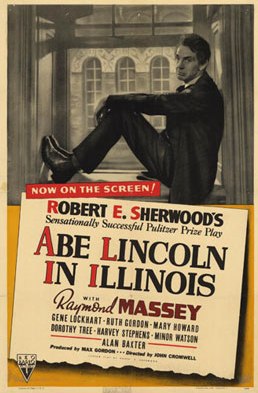
Abe Lincoln in Illinois is a 1940 biographical-drama film that depicts the life of Abraham Lincoln from his departure from Kentucky until his election as president of the United States. In the UK, the film is known by the alternate title Spirit of the People. The film was adapted by Grover Jones and Robert E. Sherwood from Sherwood's 1938 Pulitzer Prize-winning play of the same name. It was directed by John Cromwell.

Now, Voyager is a 1942 American drama film starring Bette Davis, Paul Henreid, and Claude Rains, and directed by Irving Rapper. The screenplay by Casey Robinson is based on the 1941 novel of the same name by Olive Higgins Prouty.
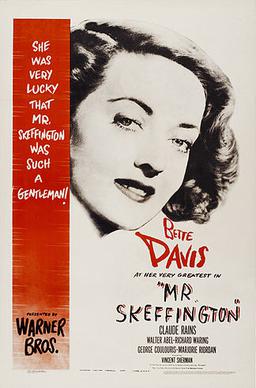
Mr. Skeffington is a 1944 American drama film directed by Vincent Sherman, based on the 1940 novel of the same name by Elizabeth von Arnim.

Notorious is a 1946 American spy film noir directed and produced by Alfred Hitchcock, starring Cary Grant, Ingrid Bergman, and Claude Rains as three people whose lives become intimately entangled during an espionage operation.

Kathleen Walsh was an English actress, dancer, and screenwriter. Her film career prospered after she met her future husband film director David Lean, with whom she worked on prestige productions such as In Which We Serve and Oliver Twist.
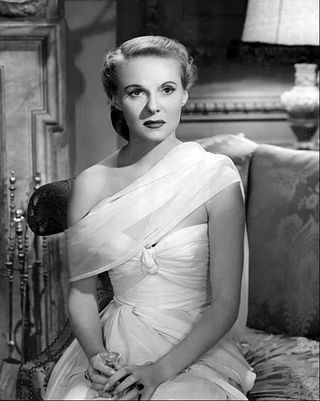
Dorothy Ann Todd was an English film, television and stage actress who achieved international fame when she starred in The Seventh Veil (1945). From 1949 to 1957 she was married to David Lean who directed her in The Passionate Friends (1949), Madeleine (1950), and The Sound Barrier (1952). She was a member of The Old Vic theatre company and in 1957 starred in a Broadway play. In her later years she wrote, produced and directed travel documentaries.
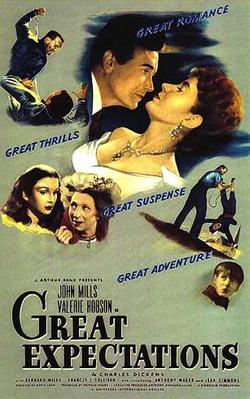
Great Expectations is a 1946 British drama film directed by David Lean, based on the 1861 novel by Charles Dickens and starring John Mills and Valerie Hobson. The supporting cast included Bernard Miles, Francis L. Sullivan, Anthony Wager, Jean Simmons, Finlay Currie, Martita Hunt and Alec Guinness.
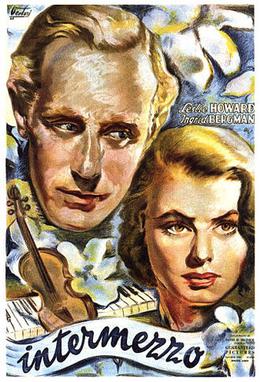
Intermezzo is a 1939 American romantic film remake of a 1936 Swedish film of the same title. It stars Leslie Howard as a married virtuoso violinist who falls in love with his accompanist, played by Ingrid Bergman in her Hollywood debut. The film was directed by Gregory Ratoff and produced by David O. Selznick. It features multiple orchestrations of Heinz Provost's title piece, which won a contest associated with the original film's production. The screenplay by George O'Neil was based on that of the original film by Gösta Stevens and Gustaf Molander. It was produced by Selznick International Pictures.

My Reputation is a 1946 American romantic drama film directed by Curtis Bernhardt. Barbara Stanwyck portrays an upper-class widow whose romance with an army officer causes trouble for her gossiping friends, domineering mother and young sons. Catherine Turney wrote the script, an adaptation of Clare Jaynes' 1942 novel Instruct My Sorrows. Stanwyck's costumes were designed by Edith Head.
Sir Anthony James Allan Havelock-Allan, 4th Baronet was a British film producer and screenwriter whose credits included This Happy Breed, Blithe Spirit, Great Expectations, Oliver Twist, the 1968 version of Romeo and Juliet and Ryan's Daughter.
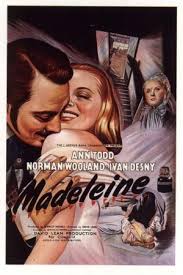
Madeleine is a 1950 British film noir directed by David Lean, based on a true story of Madeleine Smith, a young Glasgow woman from a wealthy family who was tried in 1857 for the murder of her lover, Emile L'Angelier. The trial was much publicised in the newspapers of the day and labelled "the trial of the century". Lean's adaptation of the story starred his wife, Ann Todd, with Ivan Desny as her character's French lover. Norman Wooland played the respectable suitor and Leslie Banks the authoritarian father, both of whom are unaware of Madeleine's secret life. Lean made the film primarily as a "wedding present" to Todd, who had previously played the role onstage. He was never satisfied with the film and cited it as his least favourite feature-length movie.

Sons and Lovers is a 1960 British period drama film directed by Jack Cardiff and adapted by Gavin Lambert and T. E. B. Clarke from the semi-autobiographical 1913 novel of the same name by D. H. Lawrence. It stars Trevor Howard, Dean Stockwell, Wendy Hiller, Mary Ure, and Heather Sears.
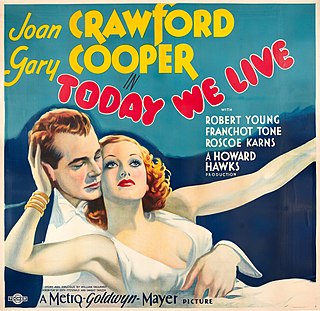
Today We Live is a 1933 American pre-Code romance drama film produced and directed by Howard Hawks and starring Joan Crawford, Gary Cooper, Robert Young and Franchot Tone.

Forsaking All Others is a 1934 American romantic comedy-drama film directed by W.S. Van Dyke, and starring Robert Montgomery, Joan Crawford and Clark Gable. The screenplay was written by Joseph L. Mankiewicz, which was based upon a 1933 play by Edward Barry Roberts and Frank Morgan Cavett starring Tallulah Bankhead.
Cineguild Productions was a production company formed by director David Lean, cinematographer Ronald Neame and producer Anthony Havelock-Allan in 1944. The company produced some of the major British films of the 1940s.


















